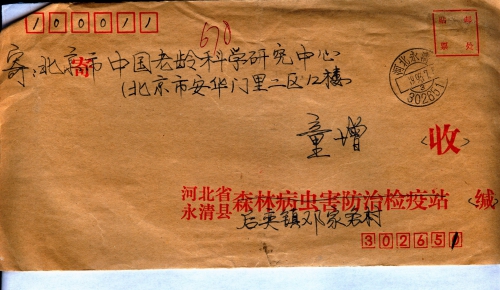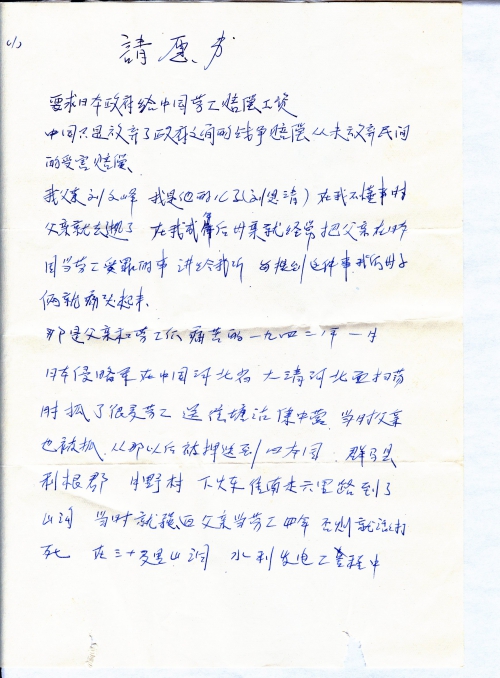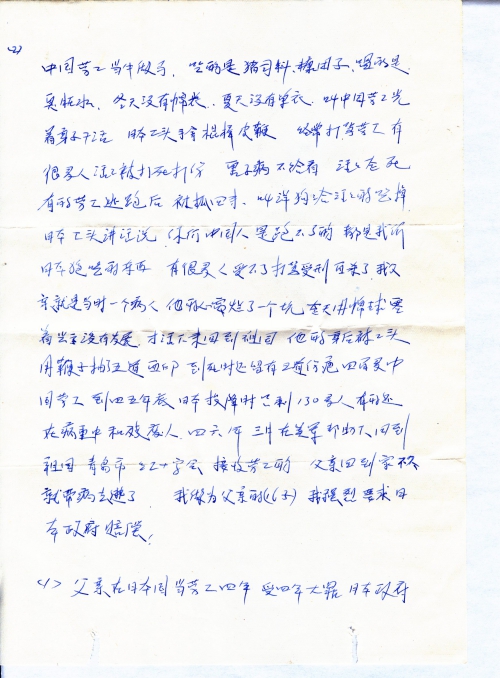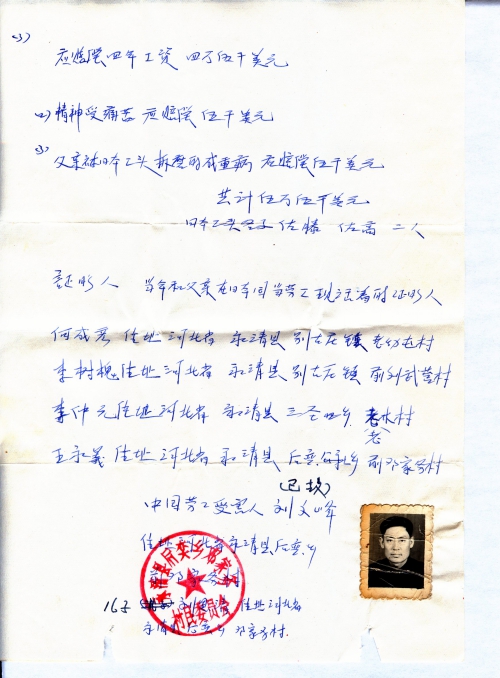Date of letter:July 5, 1993
Address of author:Yongqing County, Langfang City, Hebei Province
Date of event:January 1942
Location of event:Yongqing County, Langfang City, Hebei Province
Name of author:Liu Siqing
Name(s) of victim(s):Liu Yongfeng (Liu Siqing’s father)
Type of atrocity:Slave Laborers (SL)
Other details:In January 1942, when the Japanese army was attacking Daqinghe, Hebei Province, Liu Siqing’s father Liu Wenfeng was caught to work as a slave laborer in Japan. When the anti-Japanese war wsa ended, he was sent back home. In the letter, there is the testimony of 4 people who were caught together to be slave laborers as well as the proof stamped with seal by the village committee.
Petition
Urge the Japanese Government to compensate the salaries for the Chinese laborers
China has only abandoned the war reparations between governments, but has never given up claiming civil reparations for victims.
My father was Liu Yongfeng; I am his son (Liu Siqing). My father passed away when I was too young to know things. When I grew up, my mother often told me stories about my father being a laborer in Japan. Every time we spoke of it, we cried grievously.
That was in January, 1942 when the Japanese invaders swept in the north of Daqing River, Hebei Province, caught a lot of laborers and sent them to Tanggu Concentration Camp. My father was one of them, and was escorted to Tsukiyono Village, Tone District, Gunma County, Japan(群马县利根郡月野村), a ravine six lis (1 li = 500 meters) south from the train station. They forced him to be a laborer for 4 years, or he would be beat to death. In the over-30-li-long-cave which was used for hydroelectricity project, the Chinese laborers worked like horses, eating pig feed and chaff dumplings, and drinking stinky and dirty water. There were no coats in winters or shirts in summers. The Chinese were forced to work nakedly, while the Japanese overseers beat and yelled at them with clubs and whips. Some of them were beat to death and injuries. They could not receive treatment when getting sick and died eventually. Some of them were arrested after trying to escape, and bitten dead by foreign dogs. The Japanese overseers said:’ You Chinese can never escape; you are the food of our Japanese dogs.’ Many people couldn’t bear the torture and punishment and committed suicide. My father was a patient at that time; his chest was rotten and the wound had to be stuffed with cotton. Fortunately, the illness did not deteriorate, so he came back to China alive. His back was whipped five bloodstains by the overseers, and the five scars remained until he died. When Japan surrendered, only around 130 survived among the 400 Chinese laborers, and some of them were severely sick and disabled. In March, 1946, they came back with the help of the American army and were received by Qingdao Red Cross. My father died of sickness soon after coming home. As his son, I strongly require the Japanese Government to indemnify the losses!
1. My father worked as a laborer in Japan for four years and suffered for four years, so the Japanese Government shall compensate 45,000 US dollars as four years’ salaries.
2. It shall pay 5,000 US dollars as reparations for mental suffering.
3. My father was tortured by the Japanese overseers, which should indemnify 5,000 US dollars.
Altogether 55,000 US dollars
The names of Japanese overseers: Sato and Sataka
Testifiers: the living testifiers who worked as laborers with my father in Japan
He Chengyan, address: Laoyoudun Village, Bieguzhuang Town, Yongqing County, Hebei Province
Li Shuhuai, address: Qianliuwuying Village, Bieguzhuang Town, Yongqing County, Hebei Province
Li Zhongyuan, address: Laomu Village, Sanshengkou Township, Yongqing County, Hebei Province
Wang Yongyi, address: Qiandengjiawu Village, Houyi Township, Yongqing County, Hebei Province
Chinese laborer victim: Liu Yongfeng (deceased)
Address: Qiandengjiawu Village, Houyi Township, Yongqing County, Hebei Province (Village Committee Seal)
Son: Liu Siqing
Address: Dengjiawu Village, Houyi Township, Yongqing County, Hebei Province


















